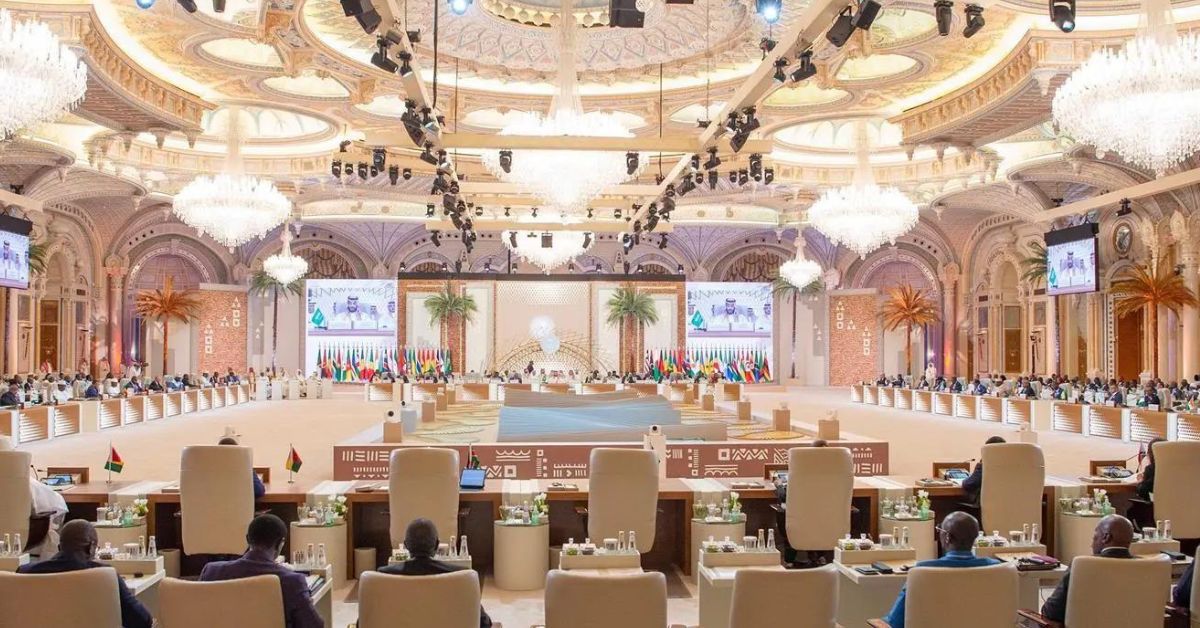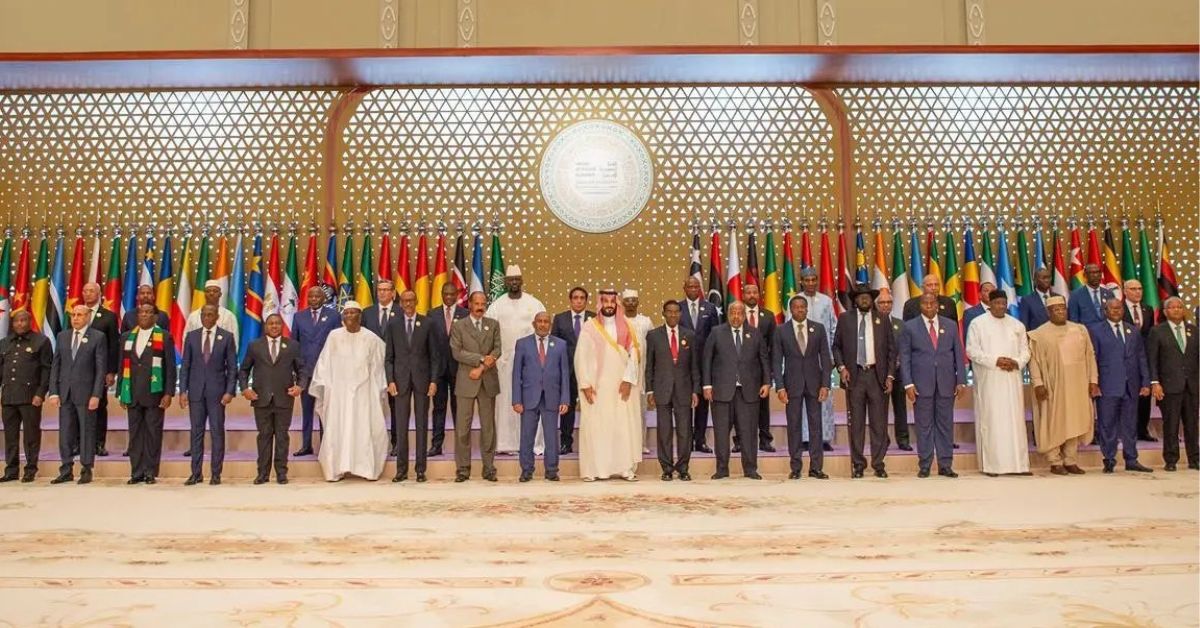Riyadh – Leaders attending the Saudi-African Summit held in Riyadh have collectively expressed their concern over the humanitarian catastrophe unfolding in Gaza, emphasizing the urgent need to halt military operations in the Palestinian territories.
The summit, which brought together influential figures from across the Saudi and African regions, served as a platform for addressing critical geopolitical issues, with a significant focus on the Palestinian-Israeli conflict.
They stressed the importance of protecting civilians, underscoring the necessity of adherence to international law and humanitarian principles.
The summit’s participants called for increased international pressure on Israel to cease its attacks and halt the forced displacement of Palestinians from the Gaza Strip. They condemned these actions as blatant violations of international humanitarian law and other international statutes.
#Saudi_African_Summit
— TRENDS (@mena_trends) November 10, 2023
Saudi Crown Prince Mohammed bin Salman Al Saud and African countries' leaders take a group photo before the #SaudiAfricanSummit.
Video credit: @Spa_Eng @KSAmofaEN @PresidencyZA @HRHMBNSALMAAN pic.twitter.com/qfX9UYmjSd
The leaders also highlighted the critical role of international humanitarian organizations in providing aid to the Palestinian people. They pointed to the United Nations Relief and Works Agency for Palestine Refugees (UNRWA) and the need to support its efforts in delivering relief and assistance to those affected by the conflict.
The leaders at the summit emphasized the importance of intensifying efforts to achieve a comprehensive and just resolution to the Palestinian-Israeli conflict. They advocated for a solution based on the principle of the two-state solution, aligning with the Arab Peace Initiative and relevant international resolutions.
“The goal, as stated, is to ensure the establishment of an independent Palestinian state within the 1967 borders, with East Jerusalem as its capital, said the Riyadh Declaration, issued at the conclusion of the summit.
Also Read Exclusive reports on Gaza-related developments
The declaration marked a significant moment in international diplomacy, with Saudi Arabia and African countries uniting in their call for peace and justice in the Middle East. The leaders also committed to enhancing cooperation in defense, counterterrorism, and combating extremism.
Economic, Development, and Investment Relations
The declaration recognized the historical economic ties between Saudi Arabia and Africa, with Saudi Arabia having provided over $45 billion in development support to African countries over the past 50 years.
The leaders agreed to further enhance trade and economic cooperation, capitalizing on the diverse economic potentials and opportunities presented by Saudi Arabia’s Vision 2030 and Africa’s Agenda 2063.
Energy and Environmental Initiatives
The leaders discussed the pivotal role of Saudi Arabia and OPEC+ countries in stabilizing global oil markets. They expressed interest in exploring cooperation in energy efficiency and renewable energy sources.
The declaration also supported the Saudi Green Initiative and the Green Middle East Initiative, aligning with efforts to combat climate change.

Cultural, Educational, and Civilizational Communication
The declaration called for promoting cultural coexistence and human tolerance, strengthening cultural cooperation, and organizing joint activities in sports and media.
It emphasized the importance of empowering women and preserving the rich cultural heritage of both regions.
Humanitarian and Health Cooperation
The leaders stressed the need to strengthen food and drug control, enhance sustainable development programs, and improve living standards in African countries.
The declaration highlighted the importance of developing human and agricultural resources, health services, and addressing humanitarian challenges.
The Riyadh Declaration represents a renewed commitment to strengthening the strategic partnership between Saudi Arabia and African countries. It opens new horizons for future relations and cooperation across various fields, reflecting the shared interests and historical ties that bind these regions.
The summit’s outcomes are expected to pave the way for a more prosperous and interconnected future between Saudi Arabia and the African continent, the declaration said.
The Saudi-African Summit At A Glance * Issuance of Riyadh Declaration: A roadmap for Saudi-African cooperation, marking a historical turning point in relations. * The Summit Overview: Held in Riyadh on November 10, 2023, focusing on strengthening strategic partnerships and cooperation in various fields. * Consensus on Regional and International Issues: Leaders expressed satisfaction with the productive dialogue and consensus on current issues. * Commitment to Strengthen Cooperation: Renewed commitment to enhance Saudi-African relations in political, economic, cultural, and social fields. * Tribute to Saudi Support for African Union: Acknowledgment of Saudi Arabia's early support for the African Union's G20 membership. * Focus on Palestine and Gaza: Deep concern over the humanitarian situation in Gaza, emphasis on stopping military operations and protecting civilians. * Advocacy for Two-State Solution: Urging a comprehensive settlement of the Palestinian-Israeli conflict based on international resolutions. * Non-Interference and Sovereignty: Emphasis on respecting sovereignty and non-interference in internal affairs of countries. * Defense and Counterterrorism Cooperation: Agreement to develop cooperation in defense and concerted efforts to combat terrorism and extremism. * Maritime Security and Organized Crime: Intensified cooperation in maritime security and combating organized crime, including drug smuggling and human trafficking. * Economic and Developmental Relations: Recognition of Saudi Arabia's $45 billion development support to Africa; emphasis on enhancing trade and economic cooperation. * Energy and Environmental Initiatives: Discussion on Saudi Arabia's role in global oil markets and cooperation in renewable energy and climate change initiatives. * Cultural, Educational, and Civilizational Communication: Promoting cultural coexistence, organizing joint activities, and empowering women. * Humanitarian and Health Cooperation: Focus on strengthening food and drug control, sustainable development, and improving living standards in Africa. * Formation of Working Groups: Establishment of groups to follow up on political, economic, cultural, and humanitarian affairs within six months post-summit.








